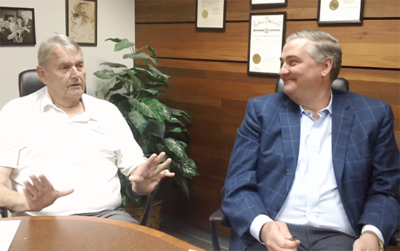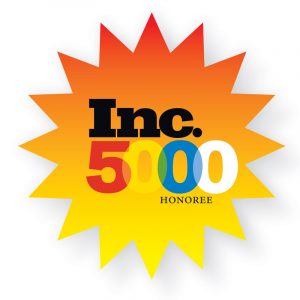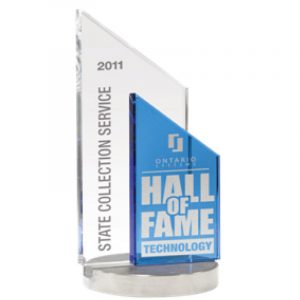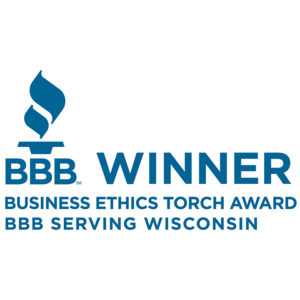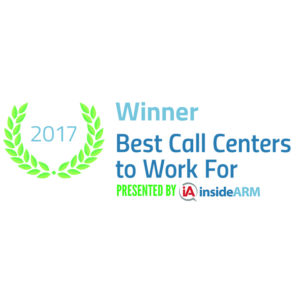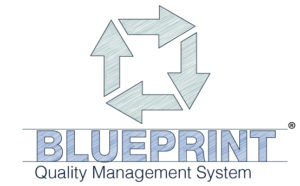As we celebrate 70 years of State Collection Service, Tom and Tim Haag sat down with us for an interview about the company, how they got started, what 70 years means to them, and what the future holds.
SETTING THE STAGE State’s Humble Beginning
Tom: I’m Tom Haag, the son of Hilding Haag who started the organization.
Tim: I’m Tim Haag, Tom’s son, and Hilding’s grandson. I’m also the current President of State Collection Service.
Tom, you were pretty young when Hilding started State. Did you always know that this is where you wanted to end up?
Tom: Absolutely not! My earliest memory is that I wanted to be in the collection business, but it was trash collection. I absolutely loved to watch the garbage trucks go around, and the guy hanging on the back end of the garbage truck, to pick up garbage weekly, and that’s what I really thought would be my career. And, somebody’s got to do it, which is what we now say about the debt collection industry.
Do you think Hilding always expected the company would be around long enough for you to take over at some point?
Tom: No, I actually wish the story was a little more delightful than it is. But the fact is, I never applied myself in high school and my parents said, “What are we going to do with Tommy, he’s going to waste himself away!” I think this the real reason I ended up in this business.
I was in my late 20’s and the turning point was the day my dad left on a fishing trip and decided he wasn’t coming back to work. His office was open and several of the staff decided to move my things into his office – that’s how I took over running State Collection. That was a big deal. It obviously kind of scared me, but it was a big deal, and caused me to work harder and be better at what I was doing. But it was a good friend of my dad’s – another collection agency owner – who really lit a fire under me. He told the world that State Collection was going down the drain because [Hilding] turned the company over to his kid. When I heard that, I said, “You know, there is absolutely no way I will let this company fail.”
EXPERIENCE PAYS in a Family Business
So Tim, you didn’t come here fresh out of high school and instead did a number of other things before you came to State. What was it that compelled you to join the company?
Tim: From a young age, I was always kind of an entrepreneur. I always wanted to work and was very motivated by money, even though my mother would always just make me put it in the bank. Anytime I could be working, I was working. It was at that young age that I knew I wanted to be in business.
In college, I was extremely motivated; I think a lot of that fuel came from my father, his story, and that he never took the opportunity to go to college. Towards the end of my college career is when Tom started asking me what my plans were when I graduated. “I’ve got a job here for you”, he’d say. But I wasn’t really sure what I was going to do. During the summers, I had an internship with a small company in the Chicago area and I eventually started working there after graduation.. I was pretty proud because, in my first year with the company, I turned around a side of the business that had been taking a loss for some time.
I stayed with that company for quite a few years. The business owners had always said their plan was for me to take over the business. Unfortunately, I realized that they wouldn’t reinvest the profits into growing the business, so I had to change course.
At some point after that realization, I started having some really tough days at work. I called my dad up and said, “If that offer still stands, I’ll take you up on it”. So I drove up to Madison and spent the day meeting with a lot the staff. I remember walking out of the office that afternoon, and calling my father to say, “You really have an amazing group of people working for you, and I’m really excited to work with them!” And, as they say, the rest is history.
Fast-forward 10 years. Are you glad you had work experience before joining State? Do you think things would have turned out differently had you not done that?
Tim: I think so. Because I came here with experience from other businesses and juggled many different responsibilities, I think others in the company saw that and realized I wasn’t just some “snot-nosed kid” coming out of college and getting paid just because he’s the owner’s son. When I talk to people, I always recommend they go out at least for a year or two to get experience so they can prove themselves when they come to work for a family business.
Like Tom, you dipped your toes into nearly every area of the company before taking over as President last year. That seems so essential to being successful in this role.
Tim: Typically, job descriptions are one page – when I started here, mine was three pages! It was part Client Services, part Sales, part Marketing. And I think the last line on it said, “Pretty much whatever Dad says.”
But in all seriousness, I think one thing that was important and one of the many smart things he did was that I never reported to him. He always had me report to other people. He had a really good team in place and put really strong people around me, so I’ve had a lot of mentors over the past decade.
Tom: Yeah, I knew the challenges I had faced because I was the “boss’s kid” and so I tried to be sensitive to that in Tim’s case. I remember telling him, “Hey, you’re going to have a lot of friends because you’re the boss’s kid, but you’re also going to create a lot of animosity because you’re the boss’s kid. They’re going to figure you always have the upper hand so you have to sell yourself to the people.” I wasn’t even there when Tim started, so him understanding this was critical. Of course, I knew my team pretty well – I knew that if it wasn’t a good fit, if they didn’t feel good about it, they would have told me that. Fortunately, they all felt it was a good fit and here we are.
In your mind, what do you think working for a family-owned business should feel like?
Tim: I’ll jump in here just because I’m thinking about it, I like to have that family environment. The first word that kind comes to mind is “trust”.
Tom: That’s what I was going to say!
Tim: You trust your family, and you want to trust your work family, whether that means the person sitting next to you, or your supervisor, your boss, or leadership, or the owner. I think that’s the thing. Making sure employees feel heard because being a part of a family also means you’re listened to, and that you’re not just a number.
There are many employees who take the time to say, “Other places are nothing like this.” I recently had an employee tell me as I was leaving one evening, “I’ve just got to tell you, I’ve never worked for a company that has had a president like you. At my last company, we were never allowed to talk to the president so when I first found out that you were the president, I asked someone if we could speak to you. My coworkers all laughed and said, ‘Speak with him? Go into his office right now and just start up a conversation with him!’”. She was amazed by that, and my hope is that everyone in this organization feels comfortable enough to come to me, or Tom, or anyone else on our leadership team when they need to.
THE COMPANY THAT HILDING BUILT and Where State’s Headed
What’s something your father did or said to you that’s really stuck with you?
Tom: Be fair. Be fair to your customer, be fair to your employees, be fair to the consumer. His favorite line always was “You collect more bees with honey than with vinegar.” And he was right – that was 50 years ago and it couldn’t be truer today.
Tim: I still remember the first day, he said, “Just remember, you’ve got to prove yourself. Everybody’s going to be watching you to make a mistake and all eyes are on you.” I wasn’t worried about that at all, I was never nervous about that.
From that first day I started, and every day since, when I walk through the door, if it’s this office or any other office, it makes me very proud. That’s what I think about. I can still say that I look forward to being in the office; there hasn’t been a day that I haven’t wanted to come to work. We all have some bad days, but we also look forward to what tomorrow brings.
Something else he said that’s stuck with me: do the right thing. Treat people the right way. Treat people the way you want to be treated. Always make sure that the
client is taken care of and make sure the people around you want to continue being around you. I think we’ve been doing that very well and I know we’ll continue to hold true to that.
A few years after I started with the company, we were challenged to try and win the Best Places to Work award. At that time, I was probably a bit of a Debbie Downer on the whole thing, but I did say, “We’re nowhere near that right now, but I want us get there so let’s take a shot at it.” That first year was rough, but our employees gave us so much great feedback through the process. And here we are now, having won the award for the last four consecutive years.
We are in the business of customer service. If you don’t have happy people, how can you provide excellent customer service? This has always been a great place to work, but I think when Tom physically stepped away from the office and others stepped in, we saw a little disconnect. But over some time, when I had built a little bit of a reputation and felt comfortable enough to know that I had the permission to do some things differently, our staff went back to seeing State as a family company where they were as much a part of the family as us. As I tell our clients, “happy employees are the best employees.” That means a lot to me, and I think it means a great deal to our staff.
Tom, 70 years have passed, what do you think Hilding would say now? I imagine, he, like most entrepreneurs, wasn’t sure about seven years, let alone 70 years.
Tom: Well, he was around 10 years or so after he retired, so he used to come down and we’d have coffee and chat about things. My mother was around even longer than that, and she too worked in the business so when I would tell them about things that were happening, they were amazed. Just the amount of growth we had in that 10-year period was significant.
When I came to State we had, I think, probably 10 people including me. So State has come a long way, and they’ve been gone long enough now that probably everything would amaze them. But I’m sure they’d be a very pleased that the company is still around, still has my dad’s picture on the wall, and still keeps growing.
So, 50 plus years on, what do you think is your legacy at State?
Tom: Been here, done that! The “legacy”, if you will, would probably be that I managed to keep the company running, growing, and being successful for a long period of time. It’s paid a lot of bills, fed a lot of mouths. Very few companies are still running after so many decades. Especially family businesses. Probably less than fifty percent of second generation family businesses are successful, and that’s probably less than 10% for third generation companies.
I would also say part of that legacy, is to have known when to move things on to Tim and to know that at the end of the day, you’ve surrounded yourself with the right people for the job. Because, as I’ve always heard you say, “I always want to hire people who are smarter than me”. It’s a simple concept but hard to actually follow through on. It’s advice I would give to anybody though.
One more thought on this, don’t worry about the money. Worry about what you tell a customer you’re going to do. And then do that. Always strive to be the best at what you’re doing. You’re not always going to be the best, but you’re certainly destined for success with that as your objective.
Tim, where do you see this company going in just in the next 10 years or the next 20 years? If you could dream anything, what would you want your legacy to be?
Tim: I think something my father has done really well is that he’s invested in the people and the technology of the business knowing that the goal is to see how far we can go. We have a lot of people here who are committed to that and are excited about what the future holds.
Looking ahead, we obviously want to continue down this road. It’s been fun, and I see a lot more fun to come! I think technology is going to play an even bigger role moving forward. We’ve always been at the forefront and I think we can continue to lead here. We see the way the consumers are changing and that’s going to fundamentally change our business. We’re ahead of the curve in a lot of those areas but there’s always work to do there and ways to continue thinking outside the box. I want State to continue being a leader, something we’ve certainly been known for during my 10 years here.
What do you think Tim’s biggest impact is so far, and what do you think it will be as we move forward, as we think about the future?
Tom: If he’s done something wrong, he’s recognized it and he’s fixed it. I don’t worry when I leave Wisconsin in the winters, I don’t worry about whether concerns are being addressed, what’s happening, or if somebody is taking care of business. I know that the company is in good hands with Tim.
TOM & TIM Beyond the Business
Tell us something we might find interesting about each of you.
Tom: I do want to share something about Tim that you probably don’t know. I will tell you this, and it will shock you, but Tim is really a closet Packers fan! On the outside, he says that he likes the Chicago Bears, but he really bleeds green and gold!
Tim: On that note, when I first started, I remember people saying, “You and your father are so identical, you talk similar, you have the same mannerisms.” We talk with our hands a lot, we cross our legs, we’re always the same, but I thought that was kind of funny. I said, “I think we pretty much agree on everything except for football! Even so, we may root for different teams, but we have fun doing it!”
I all seriousness though, the first thing comes to mind is, and I think everybody knows this, but, he loves cars. I still remember my grandmother, Mabel, telling my sister and me stories about little Tommy who didn’t have stuffed animals when he was a toddler – he always wanted to sleep with his toy cars. She would have to go in and pull them out after he’d fall asleep so he wouldn’t roll over on to them and hurt himself.
He still has his toy cars, but they are just a little bigger. I have a ton of respect for the collection he’s been able to build because here we are talking about a man who has worked for 55 years and now in the last 10 years is when he really started getting into the collecting. He’s always been around them, and that’s his happy place. Every once in a while, in the summer when he’s back in Wisconsin, and if I’m coming back from the Beloit office, I might stop by his car garage in the afternoon. It’s always fun because you never know who’s going to be there, there’s always a bunch of characters.
Tom: Characters is right!
Tim: And that makes me smile because he’s doing what he loves to do.
The other little tidbit I would give you about Tom is that he had an iPhone before I did. From a technology side, there’s not much that he can’t accomplish with his iPhone. In fact, he was just showing me before how there’s an app I can use to find out how long it would take to get a haircut down the street! So you see, I wasn’t lying when I told you how important technology is to him – I even learned something new from him today!
Tom: See, there’s no end to my mentoring!
It’s fitting that Tom gets the last word. Thank you both for sharing a little more about yourselves and this company we all love.
*This article first appeared in “A State Collection Service, Inc. Newsletter Volume 25, Issue 1, Second Quarter 2019”
